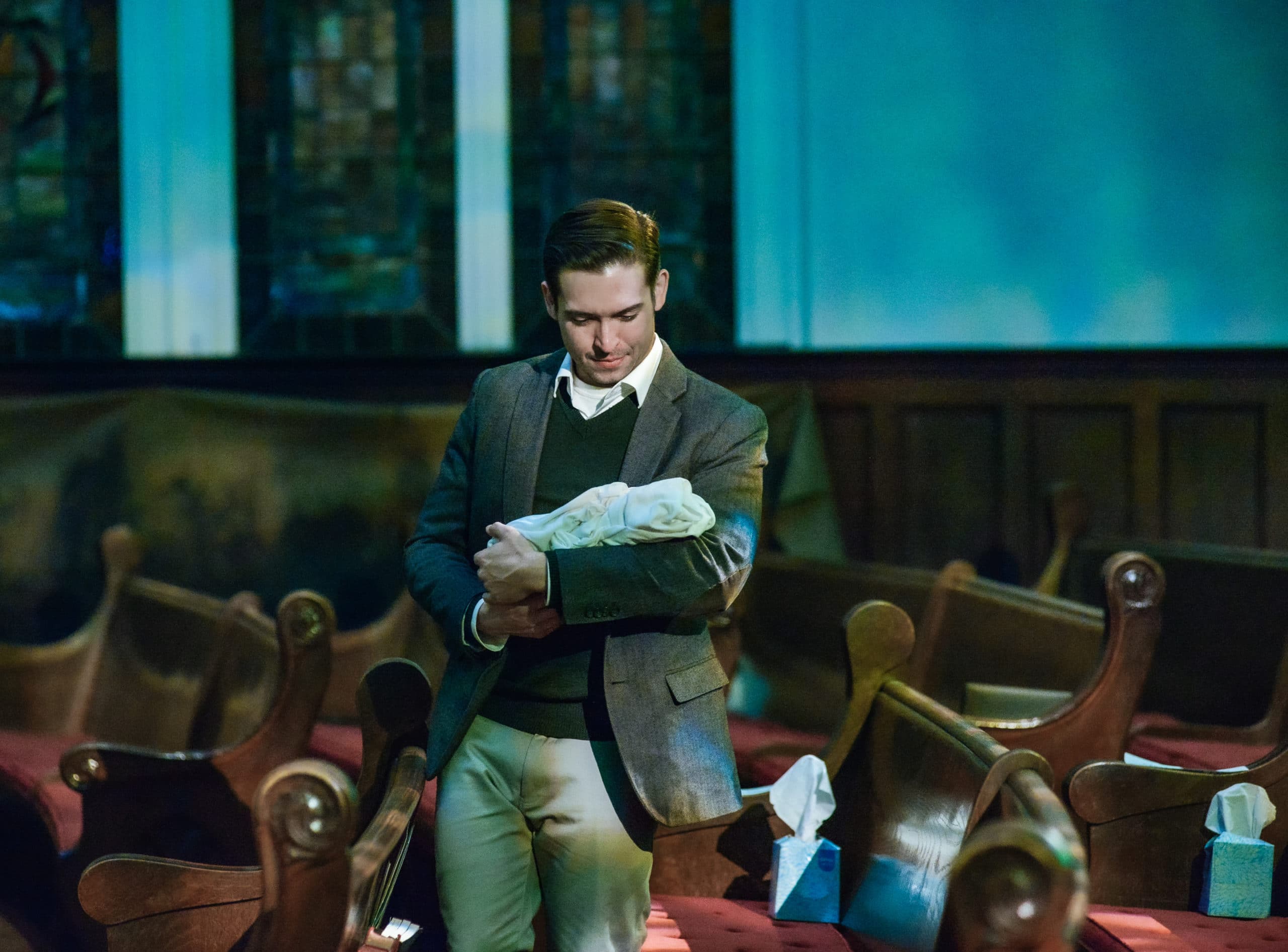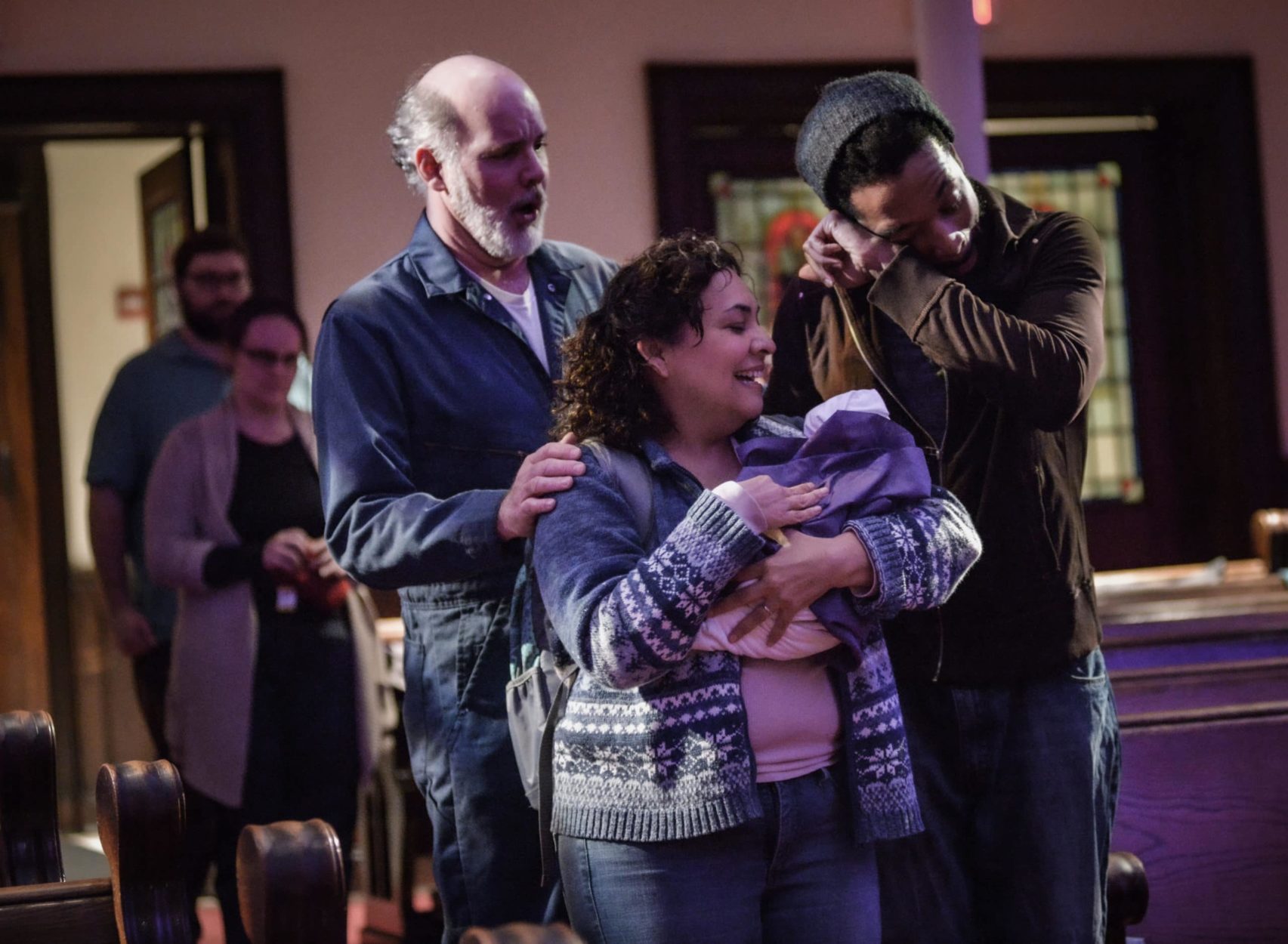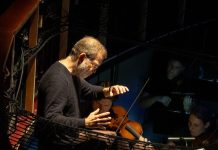Hector Berlioz’s mid-19th-century L’Enfance du Christ is not quite an oratorio in the most familiar sense of that term. Nor is it quite an opera. Written piecemeal over many years by a composer who professed to be an agnostic, but on whom religious art and music were profound influences, it emphasizes the human dimensions of familiar stories rather than piety. Not quite an Advent story in the strict sense – Jesus is already born when the piece opens – it can fairly be considered a meditation on the implications of what the advent anticipates.

In performance by the IN Series, directors Steven Scott Mazzola and Timothy Nelson mine the theatrical possibilities of L’Enfance and explore its resonance for today’s world. Rather than using a traditional concert format, the production moves its singers throughout the stage, aisles, pews, and balcony of the capacious Foundry United Methodist Church. It is an amalgam of sacred music performance and immersive theater.
From the beginning, when the Narrator (tenor Ian McEuen) relates how the news of Jesus’ birth set kings trembling on their thrones, the political dimensions of the story are front and center. Polydorus (Elliot Matheny) and another centurion (Joseph Kaz), wearing ICE vests, march a line of detainees into the space, commenting on the agitation of King Herod (baritone Kerry Wilkerson). Herod, in the evening’s longest aria, longs for rest he cannot find in his never-ending nights. Persuaded by a group of soothsayers that only bloodshed can eliminate the threat to his throne, Herod orders the “massacre of the innocents.”
Mary (soprano Elizabeth Mondragon) and Joseph (bass-baritone Jarrod Lee) are roused from their postpartum reverie, staged in the balcony, by angels who warn them to get out of town while there’s still time. (Spoiler alert: they make it.) In one of the two choral highlights of the performance, the chorus (the excellent Foundry church choir), representing Bethlehem’s shepherds, sing a sweet farewell. Following a peaceful rest stop at an oasis, the family staggers, half-dead, into the Egyptian town of Sais.
There they are at first rejected by Egyptians and Romans, who “despise you, homeless and vagabonding race.” Finally, they are welcomed by an “Ishmaelite” father, also played by Wilkerson, intentionally double-cast with his role as Herod, bookending the response to the birth of the Savior between the fear and violence of the king and the generosity and hospitality of the father. The narrator then sums up how “gentleness, kindness, wisdom, and love united” of this stranger permitted Jesus to return to his native land to perform his work of salvation. The full cast ends the performance with an inspiring a capella prayer and amen, the beauty of which is sublime.
Musically, the performance is an unqualified success, conducted with sensitivity by music director Stanley Thurston. Each of the performers sings with conviction and nuance, effectively conveying his or her character effectively. As Joseph, Lee makes a particularly strong impression both acting and singing. Thurston’s nine-piece orchestra was equally good, maintaining good balance with the singers throughout and shining in the several orchestral interludes in the score. The directors intentionally, and wisely, limited movement during many of these interludes, to avoid drawing focus from the music itself.

As several participants mentioned in a post-performance talkback, Foundry is a challenging space acoustically, capable – despite the singers’ conscientious efforts – of swallowing up not only final consonants but, at least from my vantage point, whole phrases. The singers’ sound is not adversely affected, but the audience’s ability to comprehend some of the words is compromised. Recognizing this issue, IN Series provided a handout with the English language libretto (translation by John Bernhoff from the original French). If you go to next Saturday’s performance, be sure to pick one up. It helps.
The theatrical presentation of the piece is often inventive and subtle. Gathered white cloths stand in for babies–not only Jesus, but also the children torn from their parents by the authorities during the massacre, in the performance’s single most striking theatrical moment. At times, the narrator, representing a kind of modern everyman, holds the cloth bundle representing Jesus, who belongs to humanity, not only to Mary and Joseph. At the end, as he sings of the sacrifice that Jesus is called upon to make, he unravels the bundle into a kind of shawl spreading over him. McEuen also moves around the space much more quickly than do the other performers, contrasting, perhaps, the rapid pace of modern life with the more stately, ceremonial movements of the others.
It speaks well for IN Series’ sense of its mission to mount L’Enfance at a time when traditional December warhorses, even if well performed, can grow wearying, and can be watched or listened to without considering the sharpness of what they may mean. What Berlioz wrote, and the meaning given it by this production, run no such risk. One cannot watch this performance without contemplating, and perhaps acting in response to, the real situation of millions of the world’s people.
During his recent visit to Thailand, Pope Francis made the following comments to Jesuits there, quoted in the December 5 issue of the Jesuit journal La Civiltà Cattolica:
The phenomenon of refugees has always existed, but today it is better known because of social differences, hunger, political tensions and especially war…What is the answer the world gives? The policy of waste. Refugees are waste material. The Mediterranean has been turned into a cemetery. The notorious cruelty of some detention centers in Libya touches my heart. Here in Asia we all know the problem of the Rohingya. I must admit that I am shocked by some of the narratives I hear in Europe about borders. Populism is gaining strength. In other parts there are walls that even separate children from parents. Herod comes to mind.
I think Berlioz would agree, and IN Series makes the connection unmistakably clear.
Running Time: One hour and 20 minutes, with no intermission.
L’Enfance du Christ, presented by the IN Series, will receive one more performance, on December 14, 2019, at Foundry United Methodist Church, 1500 16th Street NW, Washington, DC. For tickets, call 202-204-7763 or go online.





I shuddered when the babies heads and bodies were dashed and crushed, even though they were only cloth. Thank you fir this review.